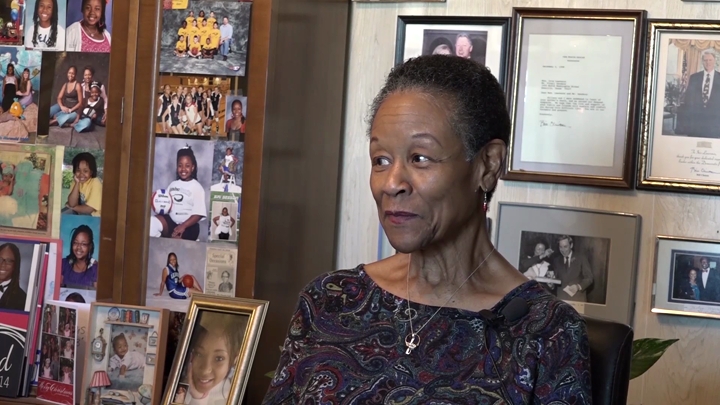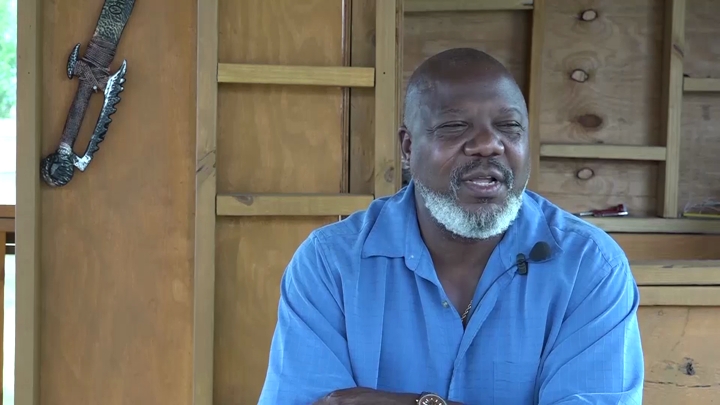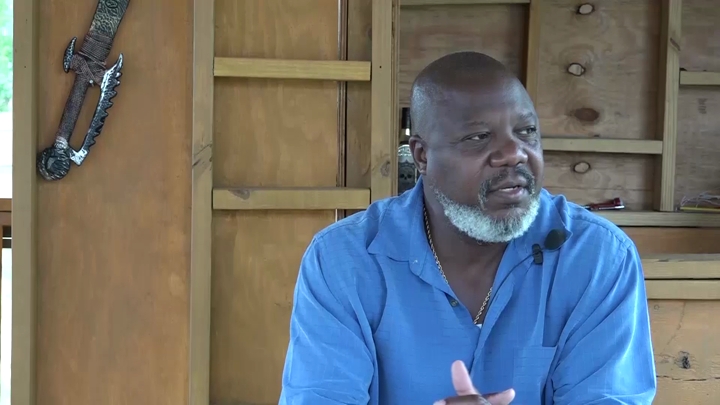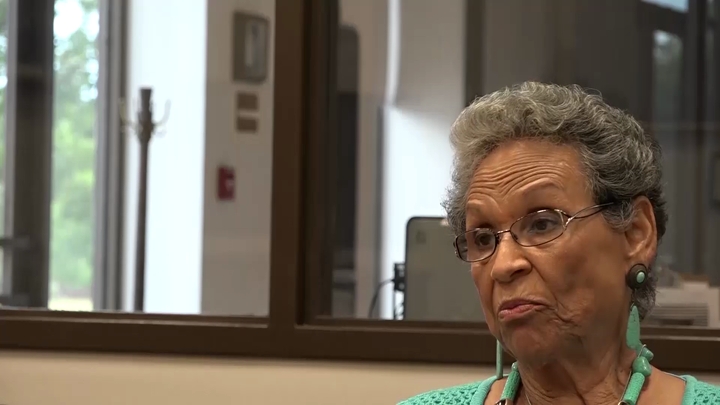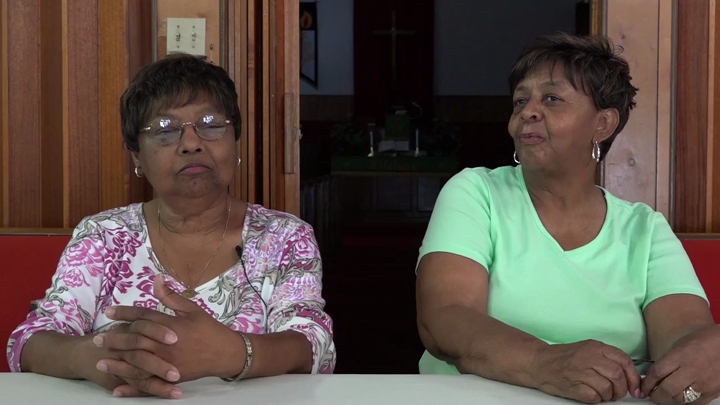Abdullah / Childhood, Part One
sign up or sign in to add/edit transcript
Interviewer: What was it like in elementary school? Did you have notable experiences in elementary school? Helena Abdullah: Yes, indeed! It was so much fun! Of course, as I said, everybody was poor. I mean, nobody had anything, but nobody cared, and nobody knew we didn't have anything. If you had a family and you were eating, you had everything you needed. All-black school. Emeline Carpenter down on Shawnee. I remember a lady named Miss Ellen Ballin. She had a store in her first-grade class and we could go in there with our pennies and our nickels and buy cookies and candy from her. I also remember taking two cents to school for our milk for lunch because we always took our lunch to school. We'd give her the two cents and she'd put it on a little list and she'd go to the cafeteria and get it and bring it back to the classroom. I remember one time going shopping with my mother to the local A&P and I wanted to get my little carton of milk just like the one at school. So, I got the carton of milk and told my mother I had my own money. When I got up to the cashier's desk, mother's groceries were going through, and she got to my milk and I said I'm going to pay for my own milk, I got my own money. I got my money out of my pocket and I put my two cents up on the thing. She said, "Honey you need more than that, that's not going to get it!" I said, "But that's what I pay at school." "Oh no, you've got to get more than that." Mother had to pay for it, it was fourteen cents. The government subsidy was twelve cents I guess. But that little carton of milk was fourteen cents. I wasn't embarrassed. I was just befuddled because I kept thinking why don't I have more money? Two cents is what I've been paying in school all year! Other than that, being around your own people all the time. I wish my children and grandchildren could grow up in that type of atmosphere. I learned to sew. I was in fifth grade. My dad worked at Lone Star and they had a place where they would sew up all of these sacks that they would put feed in. When they'd make a mistake, if it wasn't straight or whatever, rather than go back through they'd throw them away and start over and make the sacks, the seams straighter. Well my dad would bring those home to me because I used to make my doll's clothes by hand. I was too young to use the sewing machine. When he'd bring those to me, he showed me how to put the sacks in water and get that plastic off of them, that paper that showed what kind of dog food it was. When I would do that, I'd take the seam out and I'd make skirts for me and my sister. I would make some of them would be gathers, my mother showed me how to make gathers and then she showed me how to make a pleat. I would make pleated skirts for my sister and myself and I got so doggone good with that that I started making bibs to go up the front and then little straps to go over the back and they would tie, well we would pin them in the back. I started making our skirts. My mother was surprised that I caught on that quick, but I became a good seamstress after that. My elementary school years were really nice. I can't complain about anything. Interviewer: Any role models that you remember that made an impact? Helena Abdullah: My grandparents, my dad, my mother. There were people in our neighborhood. I wish I could remember some of the people. Mrs. Ola Howard that lived across the street from us. There was a blind lady that I was so impressed with that lived around the corner from us and I cannot remember her name. When I'd go to my girlfriend's house that lived next door to this lady, I would go to the lady's house. She'd give us cookies and water. I thought that was so fantastic and her house smelled always so nice and clean and like she'd just put new fruit out or something. I happened to be talking to my girlfriend about it and I said Miss so-and-so is so nice and she sure does keep a nice house. She said, "Yeah, to be blind." I said "What are you saying?" She said, "Yeah, she's blind." I said, "No she's not!" She said, "Joanie, she's blind." I went home and asked my mother and she said "Yeah, she's blind." And I thought that was the neatest thing that lady could keep her house. Everything was in its place. There were no children. Her house wasn't torn up like ours with all the kids everywhere. We felt like there weren't enough children in our home. We always had more kids. We always had kids for dinner. My mother, it frustrated her, when she would go get groceries. We'd have our friends over and we'd issue food out to our friends. Mother said, "Now look," she'd get us in the kitchen, "You can give all your food away if you want to but that's it for two weeks." So, I stopped giving my friends my food. Instead of giving them a whole orange, I'd get it and cut it into fourths with my cheap self. I'd get it and cut it into fourths and we'd eat that one orange. I learned quickly you don't give all your food away the first day you get it. Daddy and mother—there just never seemed to be a limit of food. Daddy and them would go in the country and they would get bushels of tomatoes. They'd have bushels of corn when they'd buy it. All summer long we'd have a porch full of watermelons. My grandmother was always making something. My step grandmother was always making something. We always had plenty of food to eat. As far as the clothes were concerned, I remember shopping, we'd shop for the first of school and we'd shop for Easter and my step grandmother would give us things for Christmas. My dad's mother wouldn't buy us clothes because she gave us stuff all year long. She said, Christmas is not something I'm going to celebrate and give you guys gifts because I think Christmas is every day. Every day you should celebrate your family and that's what she did. So, we knew not to expect anything from her.
| Interview | Interview with Helena Abdullah |
| Subjects | Family |
| Family › Childhood Experiences | |
| Housing › Neighborhoods | |
| Education | |
| Education › All-Black Education | |
| Education › Elementary Education | |
| Family › Parents | |
| Family › Siblings | |
| Tags | Balming, Ellen |
| Howard, Olah | |
| sign up or sign in to add/edit tags | |
| Interview date | 2016-06-30 |
| Interview source | CRBB Summer 2016 |
| Interviewees | Abdullah, Helena |
| Interviewers | Howard, Jasmin |
| Duration | 00:06:51 |
| Citation | "Childhood, Part One," from Helena Abdullah oral history interview with Jasmin Howard, June 30, 2016, Nacogdoches, TX, Civil Rights in Black and Brown Interview Database, https://crbb.tcu.edu/clips/2318/childhood-part-1-2, accessed March 01, 2026 |


